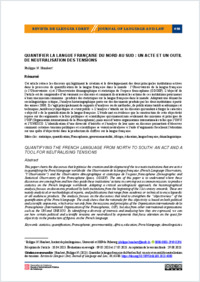Quantifier la langue française du Nord au Sud : un acte et un outil de neutralisation des tensions
BLE-BLL
- Humbert, Philippe N ORCID Université de Fribourg
- 2023
Published in:
- Revista de Llengua i Dret. - Escola d'Administració Pública de Catalunya. - 2023, vol. 80, p. 63-80
statistique
quantification
Francophonie
gouvernementalité
Afrique
éducation
langue française
démolinguistique
English
French
This article traces the discourses that legitimize the creation and development of the two main institutions active in the process of quantifying the French language worldwide: the Observatoire de la langue française ("l’Observatoire") and the Observatoire démographique et statistique de l'espace francophone (ODSEF). The aim of this article is to understand where these discourses come from and how they guide the actions of these institutions in carrying out a common mission: to produce statistics on the French language worldwide. Adopting a critical sociolinguistic approach, the historiographical analysis focuses on documents produced by the two institutions from the 2000s onwards. These are mainly analytical or methodological reports, and publications that range from the academic and technical to the encyclopaedic and "general public". The analysis focuses on the discourses that tend to forge the "objective" character of the quantification of the French language. The study shows that the construction of this objectivity is based on both political and scientific arguments that originate not only from the missions and principles of the OIF (Organisation internationale de la Francophonie), but also from other international organizations such as the UN and UNESCO. By identifying a diversity of interests and analyzing how they are put into discourse, we can see how certain political and scientific tensions are neutralized with arguments that focus on the quest for objectivity in the production of figures on the French language.
Cet article retrace les discours qui légitiment la création et le développement des deux principales institutions actives dans le processus de quantification de la langue française dans le monde : l’Observatoire de la langue française (« l’Observatoire ») et l’Observatoire démographique et statistique de l’espace francophone (ODSEF). L’objectif de l’article est de comprendre d’où viennent ces discours et comment ils orientent les actions de ces institutions pour mener à bien une mission commune : produire des statistiques sur la langue française dans le monde. Adoptant une démarche sociolinguistique critique, l’analyse historiographique porte sur des documents produits par les deux institutions à partir des années 2000. Il s’agit principalement de rapports d’analyses ou de méthodes, de publications tantôt académiques et techniques, tantôt encyclopédiques et « tout public ». L’analyse s’attarde sur les discours qui tendent à forger le caractère « objectif » de la quantification de la langue française. L’étude met en évidence que la construction de cette objectivité repose sur des arguments à la fois politiques et scientifiques qui émanent non seulement des missions et principes de l’OIF (Organisation internationale de la Francophonie), mais aussi d’autres organisations internationales telles que l’ONU et l’UNESCO. L’identification d’une diversité d’intérêts et l’analyse de leur mise en discours permet d’observer comment certaines tensions politiques et scientifiques se voient neutralisées à l’aide d’arguments focalisant l’attention sur une quête d’objectivité dans la production de chiffres sur la langue française.
- Faculty
- Faculté des lettres et des sciences humaines
- Department
- Institut de plurilinguisme
- Language
-
- French
- Classification
- Language, linguistics
- Other electronic version
- License
- CC BY-NC-ND
- Open access status
- gold
- Identifiers
-
- DOI 10.58992/rld.i80.2023.4000
- ISSN 2013-1453
- Persistent URL
- https://folia.unifr.ch/unifr/documents/332148
Statistics
Document views: 7
File downloads:
- humbert_2023_quantification-francais-nord-sud-neutralisation-tensions.pdf: 13
